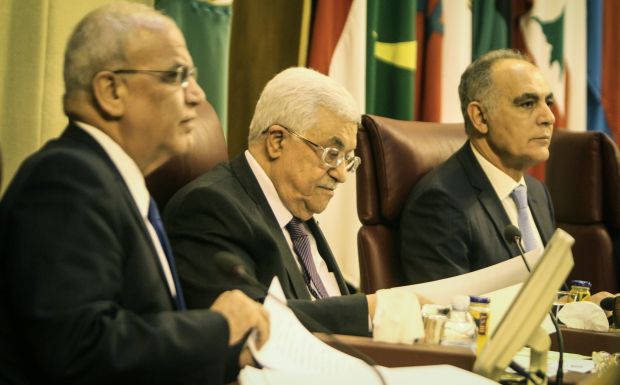
Chief Palestinian negotiator Saeb Erakat (L) sits next to Palestinian president Mahmud Abbas (C) as they attend the Arab foreign ministers meeting at the Arab League headquarters in Cairo on April 9, 2014. (AFP/Mohamed El-Shahed)
Cairo, Asharq Al-Awsat—Palestinian President Mahmoud Abbas announced on Wednesday that he would be open to extending Palestinian–Israeli negotiations on the condition that Tel Aviv agree to a number of preconditions, following Israeli Prime Minister Benjamin Netanyahu’s decision to order ministers to cut off contact with their Palestinian counterparts.
In comments to Asharq Al-Awsat, Abbas said he would support extending the negotiations, set to end on April 29, in accordance with a framework and references that would lead to the establishment of a Palestinian state with East Jerusalem as its capital. Tel Aviv has already rejected the idea of East Jerusalem as capital of a Palestinian state.
The prospects of a Palestinian–Israeli peace appeared to lessen this week after Netanyahu ordered an end to contact between his ministers and the Palestinian negotiating team in apparent retaliation against Abbas’s decision to ratify a number of international treaties.
Palestine’s decision to join 15 international conventions and agencies “is the right of the Palestinian people and has nothing to do with Israel,” Abbas told Asharq Al-Awsat.
But the Israeli side says it is a violation of Palestinian commitment to the peace process, arguing that Palestine has no international standing to ratify the treaties before it achieves full statehood.
But speaking at a press conference following the end of Wednesday’s emergency meeting, Arab League Secretary-General Nabil Elaraby said: “Israel is one country which does not abide by the rules of international law. They consider themselves above the law.”
The Arab League foreign ministers meeting also blamed Israel for “the dangerous stalemate” in the Palestinian–Israeli talks. The emergency meeting with the Palestinian president came after Tel Aviv backtracked on releasing a final batch of prisoners and announced new settlements in East Jerusalem.
The Arab foreign ministers also renewed their commitment to give the Palestinian government 100 million dollars in aid every month, urging governments falling behind on payments to the Palestinians to meet their obligations.
US Secretary of State John Kerry, who is brokering the fracturing talks, appeared earlier this week to suggest that Israel’s announcement of plans to build 700 new housing units in East Jerusalem was the reason behind the latest crisis.
During a meeting with Israeli Foreign Minister Avigdor Lieberman on Thursday, Kerry said: “We are working hard to try to find a way forward. And both parties indicate they would like to find a way to go forward in the talks.”
